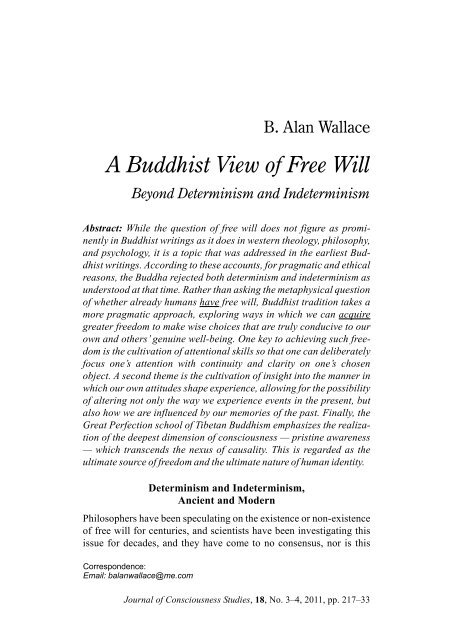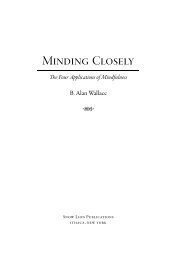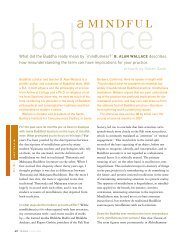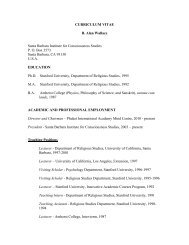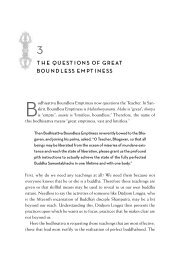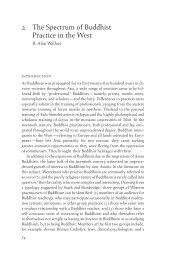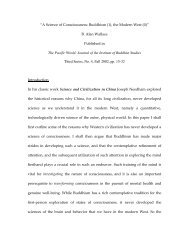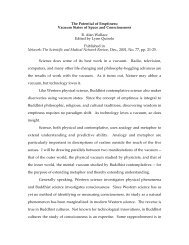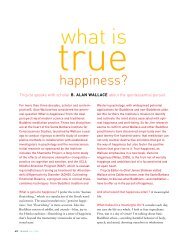A Buddhist View of Free Will: Beyond Determinism - B. Alan Wallace
A Buddhist View of Free Will: Beyond Determinism - B. Alan Wallace
A Buddhist View of Free Will: Beyond Determinism - B. Alan Wallace
You also want an ePaper? Increase the reach of your titles
YUMPU automatically turns print PDFs into web optimized ePapers that Google loves.
B. <strong>Alan</strong> <strong>Wallace</strong><br />
A <strong>Buddhist</strong> <strong>View</strong> <strong>of</strong> <strong>Free</strong> <strong>Will</strong><br />
<strong>Beyond</strong> <strong>Determinism</strong> and Indeterminism<br />
Abstract: While the question <strong>of</strong> free will does not figure as prominently<br />
in <strong>Buddhist</strong> writings as it does in western theology, philosophy,<br />
and psychology, it is a topic that was addressed in the earliest <strong>Buddhist</strong><br />
writings. According to these accounts, for pragmatic and ethical<br />
reasons, the Buddha rejected both determinism and indeterminism as<br />
understood at that time. Rather than asking the metaphysical question<br />
<strong>of</strong> whether already humans have free will, <strong>Buddhist</strong> tradition takes a<br />
more pragmatic approach, exploring ways in which we can acquire<br />
greater freedom to make wise choices that are truly conducive to our<br />
own and others’ genuine well-being. One key to achieving such freedom<br />
is the cultivation <strong>of</strong> attentional skills so that one can deliberately<br />
focus one’s attention with continuity and clarity on one’s chosen<br />
object. A second theme is the cultivation <strong>of</strong> insight into the manner in<br />
which our own attitudes shape experience, allowing for the possibility<br />
<strong>of</strong> altering not only the way we experience events in the present, but<br />
also how we are influenced by our memories <strong>of</strong> the past. Finally, the<br />
Great Perfection school <strong>of</strong> Tibetan Buddhism emphasizes the realization<br />
<strong>of</strong> the deepest dimension <strong>of</strong> consciousness — pristine awareness<br />
— which transcends the nexus <strong>of</strong> causality. This is regarded as the<br />
ultimate source <strong>of</strong> freedom and the ultimate nature <strong>of</strong> human identity.<br />
<strong>Determinism</strong> and Indeterminism,<br />
Ancient and Modern<br />
Philosophers have been speculating on the existence or non-existence<br />
<strong>of</strong> free will for centuries, and scientists have been investigating this<br />
issue for decades, and they have come to no consensus, nor is this<br />
Correspondence:<br />
Email: balanwallace@me.com<br />
Journal <strong>of</strong> Consciousness Studies, 18, No. 3–4, 2011, pp. 217–33
218 B.A. WALLACE<br />
likely in the near future. So this essay is not intended to settle the matter<br />
philosophically or scientifically. Rather, it takes a pragmatic position<br />
<strong>of</strong> pointing out the obvious: there are circumstances under which<br />
we are more or less free to make wise decisions that contribute to our<br />
own and others’genuine happiness. The cultivation <strong>of</strong> such inner freedom<br />
is a central purpose <strong>of</strong> <strong>Buddhist</strong> meditation, as one moves beyond<br />
the intellectual challenge <strong>of</strong> trying to determine whether free will<br />
exists to the experiential challenge <strong>of</strong> realizing greater and greater<br />
freedom in daily life.<br />
The diversity <strong>of</strong> Indian views concerning causality at the time <strong>of</strong> the<br />
Buddha was representative <strong>of</strong> the broader philosophical pluralism that<br />
marked that society as much as it does our world today, and the Buddha’s<br />
novel responses to those views remain as intellectually challenging<br />
and pragmatically provocative as ever. Then as now, philosophers<br />
tended to fall into one <strong>of</strong> two general camps, <strong>of</strong> determinism and<br />
indeterminism. Among the former, some asserted that all pleasant,<br />
unpleasant, or neutral experiences are due either to past karma or to the<br />
will <strong>of</strong> God (St Thomas Aquinas, 1947, pp. 1, 23, 5). The Ajivikas maintained<br />
the fatalistic doctrine that all actions are predetermined by the<br />
external force <strong>of</strong> destiny (niyati), over which people have no control. 1<br />
This view coincides closely with the nineteenth-century, deterministic<br />
view that there is at any instant exactly one physically possible<br />
future (Laplace, 1814/1957; Van Inwagen, 1983, p. 3; Pereboom,<br />
2001). This implies, for example, that the precise condition <strong>of</strong> the universe<br />
one second after the Big Bang causally sufficed to produce the<br />
assassination <strong>of</strong> John F. Kennedy in 1963 (Dennett, 2004, p. 84). The<br />
Buddha rejected all such fatalistic views regarding human action and<br />
experience on the grounds <strong>of</strong> there being inconclusive evidence to<br />
support them. Contemporary physics, which now includes quantum<br />
mechanics and chaos theory, also provides no support for determinism,<br />
so there are neither philosophical nor scientific grounds that<br />
force us to adopt that view.<br />
Other ancient Indian philosophical schools rejected determinism in<br />
favour <strong>of</strong> the view that all experiences occur as a result <strong>of</strong> pure chance,<br />
with no prior causes or conditions (Raju, 1985, chapter 3). In some<br />
respects, this view parallels that <strong>of</strong> some contemporary libertarians<br />
who argue that the indeterminism demonstrated by quantum mechanics<br />
at the subatomic level carries over to the everyday world <strong>of</strong> human<br />
experience under various specifiable conditions. For human beings to<br />
be the ultimate source <strong>of</strong> our decisions so that we are truly morally<br />
[1] Dgha Nikya, I.53
A BUDDHIST VIEW OF FREE WILL 219<br />
responsible, they insist, there can be no earlier influences that were<br />
sufficient to determine our subsequent actions (Kane, 1996; 1999).<br />
In response to all the above views, the Buddha rejected on pragmatic<br />
grounds any theory that undermined the sense <strong>of</strong> moral responsibility.<br />
On the one hand, he rejected determinism as supporting<br />
‘inaction’ — if one believes that one is not responsible for one’s<br />
actions, the will to act in a wholesome way, and not an unwholesome<br />
one, is stifled. On the other hand, he rejected the indeterminism <strong>of</strong><br />
asserting that all experiences and events arise due to pure chance,<br />
without reliance on any causes or conditions. 2 In addition, he concluded<br />
on empirical and rational grounds that there is no autonomous<br />
self that exists apart from and controls the body and mind, and he<br />
equally denied the existence <strong>of</strong> such a self among the psychophysical<br />
aggregates. 3 In taking this position, he refuted all notions <strong>of</strong> the self as<br />
an unmoved mover, as an agent that causes certain events, with nothing<br />
causing it to make its decisions (Chisholm, 1964/1982, p. 32; Foster,<br />
1991). Thus, the sense that each <strong>of</strong> us is an autonomous, nonphysical<br />
subject who exercises ultimate control over the body and<br />
mind without being influenced by prior physical or psychological<br />
conditions is an illusion.<br />
One may devote oneself to the path to freedom from suffering and its<br />
causes without knowing whether one can actually exercise freedom <strong>of</strong><br />
will that is not totally determined by prior circumstances. However, it<br />
may be helpful to have a working hypothesis for free will to be actualized.<br />
One <strong>of</strong> the main sticking points for any <strong>Buddhist</strong> affirmation <strong>of</strong><br />
free will is the nature <strong>of</strong> the self, or agent, that possesses it. We have<br />
already noted that no autonomous, controlling self can be found either<br />
among or apart from the dynamic processes and constituents <strong>of</strong> the body<br />
and mind; and this is the basis for the <strong>Buddhist</strong> assertion <strong>of</strong> ‘no-self’.<br />
The same type <strong>of</strong> analysis that is applied to the self can be equally<br />
applied to all other phenomena. For instance, the Buddha asserted that<br />
a chariot, like the self, does not exist as a substantial thing independent<br />
<strong>of</strong> its individual components. It is not equivalent to any <strong>of</strong> its individual<br />
parts, nor does the entire collection <strong>of</strong> those parts constitute a<br />
chariot. 4 The term chariot is something designated upon an assemblage<br />
<strong>of</strong> parts, none <strong>of</strong> which, either individually or collectively, is a<br />
chariot. The chariot comes into existence only when the label chariot<br />
[2] Aguttara Nikya, I.173–175; cf. Majjhima Nikya, II.214; Dgha Nikya, I.28; Samyutta<br />
Nikya, II.22.<br />
[3] Majjhima Nikya, I.230–235; Samyutta Nikya, III.66.<br />
[4] Samyutta Nikya, I.135; Milindapañh, 25.
220 B.A. WALLACE<br />
is designated on the basis <strong>of</strong> those parts. In the same way, the term I is<br />
imputed on the assemblage <strong>of</strong> the body and mind, which are not, by<br />
themselves, a real self. ‘I’come into existence only when I am conceptually<br />
designated as such. When most <strong>of</strong> us use these concepts and<br />
conventions, including the words I and mine, we grasp onto the referents<br />
<strong>of</strong> those labels as being real, independent <strong>of</strong> our conceptual projections;<br />
and this is the delusional basis for all mental afflictions, such<br />
as craving and hostility. Those who are free <strong>of</strong> delusion still use those<br />
concepts and words, but they are not fooled by them. 5<br />
Such ontological analysis can be applied to the body and mind and<br />
all their constituent parts in the same way that it is applied to the self,<br />
so that the self is no more or less real than any other phenomena. 6<br />
Therefore, just as we can meaningfully speak <strong>of</strong> a chariot performing<br />
certain functions, so can we refer to the self as an agent who makes<br />
decisions and engages in voluntary activity.<br />
If the only way <strong>of</strong> affirming human identity is as such an autonomous<br />
self, and if that is required for the existence <strong>of</strong> ‘free will’, then<br />
both are clearly refuted in Buddhism. Hegel, <strong>Will</strong>iam James, and the<br />
<strong>Buddhist</strong> tradition all agree that if you, ‘Isolate a thing from all its<br />
relations, and try to assert it by itself; you find that it has negated itself<br />
as well as its relations. The thing in itself is nothing’ (Caird, 1883, p.<br />
162). The existence <strong>of</strong> such an isolated self is refuted in Buddhism for<br />
lack <strong>of</strong> experiential evidence, but there are other ways <strong>of</strong> affirming<br />
human identity and freedom that do not hinge on such an independent<br />
ego, and on such a basis it remains meaningful to cultivate greater<br />
freedom, rather than falling back on philosophical beliefs that one<br />
does or does not already have it. These pragmatic responses <strong>of</strong> the<br />
Buddha don’t logically settle the question <strong>of</strong> the existence <strong>of</strong> free will,<br />
but they do <strong>of</strong>fer meaningful guidance for pursuing greater freedom,<br />
while leaving the ultimate status <strong>of</strong> free will in metaphysical limbo.<br />
<strong>Will</strong>iam James lends his support to this pragmatic orientation when he<br />
writes, ‘if free will were true, it would be absurd to have the belief in it<br />
fatally forced on our acceptance. Considering the inner fitness <strong>of</strong><br />
things, one would rather think that the very first act <strong>of</strong> a will endowed<br />
with freedom should be to sustain the belief in the freedom itself’<br />
(James, 1899/1958, p. 129).<br />
[5] Samyutta Nikya, I.14; Itivuttaka, 53.<br />
[6] Sutta Nipta, 937; Majjhima Nikya, III.31; Mlamadhyamakakrik, V, VIII; Gen<br />
Lamrimpa (2002); Thupten Jinpa (2002).
A BUDDHIST VIEW OF FREE WILL 221<br />
Volition and Action in Early Buddhism<br />
At first glance, this <strong>Buddhist</strong> position may seem identical to that <strong>of</strong><br />
certain contemporary cognitive scientists and philosophers <strong>of</strong> mind.<br />
For instance, in his book The Illusion <strong>of</strong> Conscious <strong>Will</strong>, psychologist<br />
Daniel M. Wegner writes: ‘It seems to each <strong>of</strong> us that we have conscious<br />
will. It seems we have selves. It seems we have minds. It seems<br />
we are agents. It seems we cause what we do… it is sobering and ultimately<br />
accurate to call all this an illusion’ (Wegner, 2003a, pp. 341–342;<br />
2003b). Nowhere in the brain do neuroscientists find any control centre<br />
that might serve as the neural correlate <strong>of</strong> an autonomous self, nor<br />
do they find any evidence <strong>of</strong> an independent self that causally influences<br />
brain functions. On the contrary, the brain appears to function<br />
according to its own internal mechanisms, with no independent self<br />
acting as a king or presiding judge governing and evaluating the<br />
brain’s activities. According to this materialistic view, all the causal<br />
influences on mental processes occur in the complex machinery <strong>of</strong> the<br />
brain, beyond the range <strong>of</strong> introspective awareness (Ainslie, 2001, p.<br />
40; Dennett, 2004, pp. 244, 254).<br />
But these apparent similarities conceal fundamental incompatibilities<br />
between Buddhism and scientific materialism. Whereas many<br />
materialists believe that brain activities precede and causally generate<br />
all mental processes and that those processes themselves consist <strong>of</strong><br />
brain activity, the Buddha turned this supposition on its head by<br />
declaring, ‘All phenomena are preceded by the mind, issue forth from<br />
the mind, and consist <strong>of</strong> the mind’. 7 Central to this <strong>Buddhist</strong> emphasis<br />
on the primacy <strong>of</strong> the mind in relation to behaviour is the role <strong>of</strong> the<br />
mental factor <strong>of</strong> volition, or will, which determines which actions<br />
have moral consequences. Indeed, the Buddha virtually equated volition<br />
with karma when he declared, ‘It is will, O monks, that I call<br />
karma; having willed, one acts through body, speech, or mind’. 8<br />
Only voluntary actions produce karmic results, and the magnitude<br />
<strong>of</strong> the moral consequences <strong>of</strong> one’s actions corresponds directly to the<br />
degree <strong>of</strong> one’s mental balance, intelligence, and understanding.<br />
Thus, the moral consequences <strong>of</strong> the actions <strong>of</strong> a person who is mentally<br />
ill or brain-damaged are relatively light, while those <strong>of</strong> a person<br />
<strong>of</strong> sound mind and clear understanding are relatively heavy. 9 This corresponds<br />
closely to modern principles <strong>of</strong> jurisprudence. Moreover, it<br />
[7] The Dhammapada, I.1.<br />
[8] Aguttara Nikya, III.415.<br />
[9] Aguttara Nikya, I.249–253.
222 B.A. WALLACE<br />
is incorrect to think that previous karma determines all <strong>of</strong> one’s experiences<br />
and feelings. Although all feelings that arise together with<br />
one’s initial awareness <strong>of</strong> sensory stimuli are the result <strong>of</strong> past karma,<br />
the feelings that arise following such stimuli are not predetermined by<br />
past karma but are rather the result <strong>of</strong> fresh karma associated with the<br />
way one responds to those stimuli. And so acts <strong>of</strong> volition are conditioned<br />
both by prior influences as well as by other factors, such as the<br />
quality <strong>of</strong> one’s awareness, that are simultaneous with it. 10 In this<br />
sense, Buddhism asserts a measure <strong>of</strong> free will in so far as one can<br />
reflect on one’s options and decide on the best course <strong>of</strong> action in<br />
terms <strong>of</strong> its moral suitability. 11<br />
<strong>Determinism</strong> and Moral Responsibility<br />
Some contemporary scientists and philosophers assert that determinism<br />
— defined as the view that there is at any instant exactly one possible<br />
future — is compatible with moral responsibility. Daniel<br />
Wegner, for instance, argues that our actions are completely determined<br />
by brain activity prior to the conscious experience <strong>of</strong> making<br />
decisions, so that consciousness doesn’t really do anything. For this<br />
reason, conscious will is an illusion, but it is nevertheless the person’s<br />
guide to his or her own moral responsibility for action, and moral<br />
action is quite real (Wegner, 2003a, pp. 59, 224, 241). But he fails to<br />
provide any cogent explanation for how something that is an illusion<br />
and doesn’t do anything can be responsible for moral action. It should<br />
also be noted that his fundamental premise that conscious will is an<br />
epiphenomenal, causally ineffective illusion has been scientifically<br />
and philosophically shown to be inconclusive (Lau, Rogers and<br />
Passignham, 2007; Dennett, 2004, pp. 228–242).<br />
Philosopher Daniel C. Dennett takes a virtually identical position,<br />
and his arguments face this same fundamental dilemma. On the one<br />
hand, he declares that each human being is nothing more than an<br />
assemblage <strong>of</strong> roughly a hundred trillion cells, each <strong>of</strong> them a mindless<br />
mechanism, a largely autonomous microrobot functioning in<br />
strict accordance with the laws <strong>of</strong> physics and biology. On the other<br />
hand, he writes, ‘Human freedom is not an illusion; it is an objective<br />
phenomenon, distinct from all other biological conditions and found<br />
in only one species, us’ (Dennett, 2004, pp. 2–3, 305). In an elaborate<br />
but fundamentally specious series <strong>of</strong> arguments, he tries to assert the<br />
[10] Milindapañha, 134–138; Visuddhimagga, 532, 535; Patthna, I.1.<br />
[11] Majjhima Nikya, I.415–416.
A BUDDHIST VIEW OF FREE WILL 223<br />
existence <strong>of</strong> ‘autonomous human agents’ who exercise free will as<br />
their ability to control action whenever there are no constraints, coercions,<br />
or compulsions that limit their behaviour. Yet nowhere does he<br />
provide any compelling argument for the existence <strong>of</strong> a human agent<br />
either among or apart from the mindless robots that totally make up a<br />
human organism.<br />
Those who argue for a ‘compatibilism’ between determinism and<br />
moral responsibility seem to be moved by independent motives. Intellectually<br />
they have persuaded themselves that the entirety <strong>of</strong> human<br />
existence, and even reality as a whole, can be thoroughly explained in<br />
terms <strong>of</strong> the human categories <strong>of</strong> physics and biology. This is the basis<br />
for their determinism. But they also feel a psychological imperative to<br />
affirm moral responsibility, without which human civilization is virtually<br />
inconceivable. Caught on the horns <strong>of</strong> this dilemma, they are<br />
forced to illegitimately introduce morality and purpose into the mindless,<br />
deterministic activities <strong>of</strong> atoms and cells, which is unwarranted<br />
by all that we currently know about physics and biology. This conundrum<br />
makes for bad science and bad philosophy.<br />
As noted previously, according to materialistic determinism, based<br />
on classical physics, the precise condition <strong>of</strong> the universe shortly after<br />
the Big Bang causally sufficed to produce the assassination <strong>of</strong> John F.<br />
Kennedy in 1963, which implies that Lee Harvey Oswald was a passive<br />
cog in the deterministic machinery <strong>of</strong> the physical world. Since<br />
his actions were predestined billions <strong>of</strong> years before he committed<br />
them, it is absurd to speak <strong>of</strong> his having any kind <strong>of</strong> free will, and it is<br />
irrational to assert that he was morally responsible for his actions.<br />
Some contemporary <strong>Buddhist</strong> scholars, while shunning materialism,<br />
do argue for the compatibility between determinism and moral<br />
responsibility, citing the <strong>Buddhist</strong> principle ‘When this exists, that<br />
comes to be, with the arising <strong>of</strong> this, that arises’. 12 Whether the universe<br />
is deterministic in accordance with purely physical causality<br />
(materialism) or in accordance with mind–matter causality (Buddhism),<br />
it is still deterministic, implying that the present is thoroughly<br />
conditioned and determined by the past. If this is true, then Lee<br />
Harvey Oswald had no more choice to kill or not kill John F. Kennedy<br />
in the world according to Buddhism than he had in the world according<br />
to materialism. If at any instant there is exactly one physically possible<br />
future, as determinism maintains, then the present is absolutely<br />
predetermined by the past. This <strong>of</strong>fers no wiggle room for any kind <strong>of</strong><br />
freedom or moral responsibility whatsoever.<br />
[12] Samyutta Nikya, II.28; Federman (2007); Harvey (2007).
224 B.A. WALLACE<br />
As noted previously, the Buddha rejected belief in any theory —<br />
either deterministic or indeterministic — that undermines our sense <strong>of</strong><br />
moral responsibility and our inspiration for abandoning vices and cultivating<br />
virtue. The lack <strong>of</strong> any philosophical or scientific consensus<br />
regarding free will, despite centuries <strong>of</strong> conceptual enquiry east and west,<br />
suggests that the causal relations among volitions, actions, and their consequences<br />
are so complex and subtle that it may be impossible to fully<br />
comprehend them with reason alone. 13 On the limits <strong>of</strong> the intellect,<br />
<strong>Will</strong>iam James wrote, ‘For my own part, I have finally found myself<br />
compelled to give up the logic, fairly, squarely, and irrevocably. It has<br />
an imperishable use in human life, but that use is not to make us theoretically<br />
acquainted with the essential nature <strong>of</strong> reality… Reality, life,<br />
experience, concreteness, immediacy, use what word you will,<br />
exceeds our logic, overflows and surrounds it’ (James, 1977, p. 96).<br />
It is vital not to become conceptually immobilized by one’s current<br />
lack <strong>of</strong> decisive understanding <strong>of</strong> the scientific or philosophical rationale<br />
for asserting the existence <strong>of</strong> moral responsibility. The important<br />
thing is first to recognize here and now the myriad ways in which we<br />
are not free to make wise choices and follow courses <strong>of</strong> action that are<br />
truly beneficial to our own and others’ well-being, and at the same<br />
time to devote ourselves to the cultivation <strong>of</strong> such freedom. <strong>Will</strong>iam<br />
James again <strong>of</strong>fers sound guidance: ‘As long as one continues talking,<br />
intellectualism remains in undisturbed possession <strong>of</strong> the field. The<br />
return to life can’t come about by talking. It is an act; tomakeyou<br />
return to life…’ (ibid., p. 131).<br />
The <strong>Buddhist</strong> Ideal <strong>of</strong> <strong>Free</strong>dom<br />
In light <strong>of</strong> a modern definition <strong>of</strong> freedom as the capacity to achieve<br />
what is <strong>of</strong> value in a range <strong>of</strong> circumstances (Maxwell, 1984), the<br />
<strong>Buddhist</strong> tradition clearly emphasizes that ordinary sentient beings<br />
are not entirely free, for we are constrained by mental afflictions such<br />
as craving, hostility, and delusion, which in turn stem from our ignorance<br />
<strong>of</strong> the true nature <strong>of</strong> reality; and, in so far as we lead our lives<br />
under the domination <strong>of</strong> these afflictions, we remain in bondage to<br />
their resultant suffering. But the Buddha posed the truly astonishing<br />
hypothesis that suffering and its internal causes are not intrinsic to the<br />
minds <strong>of</strong> sentient beings, for in every being there exists a ‘brightly<br />
shining’ dimension <strong>of</strong> awareness that, though veiled by adventitious<br />
[13] Aguttara Nikya, II.80.
A BUDDHIST VIEW OF FREE WILL 225<br />
defilements, is itself free <strong>of</strong> ignorance and mental afflictions, and this<br />
can be revealed through spiritual practice.<br />
Theravada <strong>Buddhist</strong> commentaries identify this radiant mind as the<br />
naturally pure ‘ground <strong>of</strong> becoming’ (bhavanga), the resting state <strong>of</strong><br />
the mind that is not included among the six modes <strong>of</strong> consciousness,<br />
namely the five physical senses and ordinary mental consciousness.<br />
This dimension <strong>of</strong> consciousness manifests in dreamless sleep and at<br />
death, and during the waking state the mind momentarily reverts to it<br />
between periods <strong>of</strong> engaging with its objects <strong>of</strong> cognition. 14 Under<br />
normal circumstances, one generally has no clear recognition <strong>of</strong> this<br />
relative ground state <strong>of</strong> awareness, but it can be vividly apprehended<br />
with the meditative achievement <strong>of</strong> highly focused, stable attention<br />
(samadhi), in which awareness is withdrawn from all objects, sensory<br />
and mental. The ground <strong>of</strong> becoming described in early Buddhism<br />
bears a strong resemblance to accounts <strong>of</strong> the substrate consciousness<br />
(alaya-vijñana) in the Great Perfection tradition <strong>of</strong> Tibetan Buddhism<br />
(<strong>Wallace</strong>, 2006a, pp. 14–18, 95–96; 2007, pp. 45–48).<br />
This brightly shining mind may alternatively be understood as the<br />
unconditioned state <strong>of</strong> awareness that is present after an arhat, one<br />
who has achieved nirvana, passes away, never to take rebirth again.<br />
Such consciousness, which transcends the five psychophysical aggregates,<br />
is said to be non-manifesting, timeless, and unconditioned. 15<br />
Since it is unborn — not newly created by prior causes — and is not<br />
the consciousness <strong>of</strong> someone or something other than oneself, it must<br />
already be present in each sentient being before the achievement <strong>of</strong><br />
nirvana. This realm <strong>of</strong> consciousness is beyond the scope <strong>of</strong> the conceptual<br />
mind, so its possible influence on the minds <strong>of</strong> ordinary sentient<br />
beings is unimaginable.<br />
Such transcendent, pristine awareness appears to be similar to the<br />
Buddha nature presented in Mahayana Buddhism and to the pristine<br />
awareness (rig pa) taught in the Great Perfection. This primordial<br />
dimension <strong>of</strong> consciousness is said to be the deepest source <strong>of</strong> our<br />
yearning for happiness and liberation, and this is said to be the ultimate<br />
ground <strong>of</strong> freedom for all beings (Paul, 1980, p. xiii). But since<br />
its nature transcends the domain <strong>of</strong> the conceptual, rational mind, it<br />
does not lend itself to rational analysis, and its way <strong>of</strong> impacting the<br />
mind and the rest <strong>of</strong> the natural world likewise lies beyond the realm<br />
<strong>of</strong> philosophy. It may be known directly through non-dual awareness,<br />
but it cannot be an object <strong>of</strong> the intellect.<br />
[14] Aguttara Nikya, I.61; Harvey (1995, pp. 145–146, 155–179).<br />
[15] Dgha Nikya, I.223; Majjhima Nikya, I.162.
226 B.A. WALLACE<br />
A modern <strong>Buddhist</strong> understanding <strong>of</strong> ‘free will’ does not focus on<br />
the question <strong>of</strong> whether the will is conditioned by prior causes and<br />
conditions, but rather the extent to which we have the freedom to<br />
make decisions that are conducive to our own and others’ genuine<br />
happiness. Such choices are conditioned, to be sure, but by wisdom<br />
and compassion, rather than by craving, hostility, and delusion. Meditations<br />
practised with the ordinary mind are conducted within the field<br />
<strong>of</strong> causal interactions, leading to greater and greater freedom to make<br />
wise choices. When one ‘breaks through’ ordinary consciousness to<br />
pristine awareness, one transcends the realm <strong>of</strong> the intellect and <strong>of</strong><br />
causality, and it is here that true, primordial freedom is discovered.<br />
This is not something that can be proven with logic, but it may be realized<br />
through direct experience arising from sustained, rigorous meditation<br />
practice. The <strong>Buddhist</strong> tradition would concur with James when<br />
he declares, ‘Thought deals thus solely with surfaces. It can name the<br />
thickness <strong>of</strong> reality, but it cannot fathom it, and its insufficiency here<br />
is essential and permanent, not temporary’ (James, 1977, p. 112).<br />
The path <strong>of</strong> spiritual practice may be likened to the process <strong>of</strong> refining<br />
gold ore that is contaminated by impurities. The first step on this<br />
path is to cultivate a wholesome way <strong>of</strong> life, avoiding behaviour that is<br />
injurious to one’s own and others’ well-being. On this basis <strong>of</strong> ethics,<br />
one proceeds to balance the mind through the cultivation <strong>of</strong> focused<br />
attention, for, as the Indian Bodhisattva Shantideva cautioned, ‘a person<br />
whose mind is distracted lives between the fangs <strong>of</strong> mental afflictions’.<br />
16 When the mind is subject to attentional imbalances such as<br />
laxity and excitation, it is as if one’s psychological immune system is<br />
impaired, and so all kinds <strong>of</strong> mental problems can easily overwhelm it.<br />
The cultivation <strong>of</strong> focused attention has a direct and important bearing<br />
on morality and the freedom <strong>of</strong> will. <strong>Will</strong>iam James declared in<br />
this regard, ‘”In what does a moral act consist when reduced to its<br />
simplest and most elementary form”… it consists in the effort <strong>of</strong><br />
attention by which we hold fast to an idea which but for that effort <strong>of</strong><br />
attention would be driven out <strong>of</strong> the mind by the other psychological<br />
tendencies that are there’ (James, 1899/1958, p. 126, my italics). And<br />
the French philosopher Charles Renouvier, greatly admired by James,<br />
defined free will as the sustaining <strong>of</strong> a thought because one chooses to<br />
when one might have other thoughts (Renouvier, 1912).<br />
With the development <strong>of</strong> sustained, vivid attention, one’s awareness<br />
may be introspectively focused on one’s own feelings, desires,<br />
thoughts, and intentions as they arise from moment to moment. As the<br />
[16] Bodhicaryvatra, VIII.1.
A BUDDHIST VIEW OF FREE WILL 227<br />
Indian arhat Nagasena taught King Milinda, the <strong>Buddhist</strong> practice <strong>of</strong><br />
mindfulness entails directing one’s attention to wholesome and<br />
unwholesome tendencies and recognizing them as such so that one<br />
may cultivate the former and reject the latter. 17 Such discerning, metacognitive<br />
awareness allows for the possibility <strong>of</strong> freely choosing<br />
whether or not to allow a desire to lead to an intention or to let an<br />
intention result in verbal or physical action. In short, freedom <strong>of</strong> will<br />
depends on the ability to recognize the various impulses that arise<br />
involuntarily in the mind and to choose which among them to accept<br />
or reject (<strong>Wallace</strong>, 2006b, pp. 77–127).<br />
Without such internal monitoring <strong>of</strong> one’s mental states and processes,<br />
the mind is bound to fall under the domination <strong>of</strong> detrimental,<br />
habitual conditioning, with the attention compulsively focusing on<br />
attractive appearances, thereby reinforcing craving, and on disagreeable<br />
appearances, thereby reinforcing hostility. 18 Such misguided<br />
attention is also prone to lead one to view as permanent what is impermanent,<br />
as satisfying what is unsatisfying, and as a self what is<br />
not-self. 19 To overcome such delusional ways <strong>of</strong> viewing reality, one<br />
must add to the cultivation <strong>of</strong> meditative quiescence (shamatha) the<br />
development <strong>of</strong> insight (vipashyana) through the close applications <strong>of</strong><br />
mindfulness to the body, feelings, mind, and phenomena. 20 Only<br />
through the unification <strong>of</strong> meditative quiescence and insight is complete<br />
freedom gained from mental afflictions and their resultant suffering,<br />
thereby revealing the innate purity <strong>of</strong> the brightly shining<br />
mind.<br />
The Middle Way <strong>Beyond</strong><br />
<strong>Determinism</strong> and Indeterminism<br />
The challenge <strong>of</strong> determinism remains: If all decisions and actions in<br />
the present moment are completely determined by prior causes and<br />
conditions — be they physical or mental — how can any kind <strong>of</strong> free<br />
will be posited As I have proposed earlier, the definition <strong>of</strong> determinism<br />
allows for no such freedom. Fatalism is the unavoidable implication<br />
<strong>of</strong> determinism as surely as later events are inevitably set in stone<br />
by prior conditions according to determinism. On the other hand,<br />
while some philosophers look to the indeterminism <strong>of</strong> quantum physics<br />
as a way out <strong>of</strong> fatalism, it is difficult to see how this strategy<br />
[17] Milindapañha, 37–38.<br />
[18] Aguttara Nikya, I.3; Aguttara Nikya, I.200–201; Samyutta Nikya, v. 64–65.<br />
[19] Vibhaga, 373.<br />
[20] Samyutta Nikya, v. 156.
228 B.A. WALLACE<br />
allows for a clear, coherent picture <strong>of</strong> a human agent exercising free<br />
will. Most interpretations <strong>of</strong> both determinism and indeterminism are<br />
based on the assumptions <strong>of</strong> metaphysical realism, namely that:<br />
the world consists <strong>of</strong> mind-independent objects;<br />
there is exactly one true and complete description <strong>of</strong> the way the<br />
world is; and<br />
truth involves some sort <strong>of</strong> correspondence between an independently<br />
existent world and a description <strong>of</strong> it (Putnam, 1990,<br />
p. 30).<br />
The Middle Way (Madhyamaka) propounded by Nagarjuna constitutes<br />
an utter rejection <strong>of</strong> the reification <strong>of</strong> time and causality that<br />
underlies most versions <strong>of</strong> metaphysical realism. 21 All causally conditioned<br />
phenomena arise according to a process <strong>of</strong> dependent origination<br />
in dependence on three factors: (1) prior causes; (2) their own<br />
constituent parts and attributes; and (3) conceptual designation. A<br />
chariot, for instance, arises in dependence on: (1) the materials that<br />
were used to make it and the carpenter’s work <strong>of</strong> assembling it; (2) its<br />
individual components; and (3) the conceptual designation <strong>of</strong> ‘chariot’that<br />
is imputed to this assembly <strong>of</strong> parts. The first mode <strong>of</strong> dependence<br />
entails prior causes and conditions resulting in a subsequent<br />
product. The dependence <strong>of</strong> the chariot on its parts is simultaneous:<br />
the whole and the parts exist simultaneously. And the chariot as the<br />
designated entity comes into existence simultaneously with its conceptual<br />
designation as such.<br />
For all phenomena the basis <strong>of</strong> designation is never identical to the<br />
object that is imputed on that basis. To take the same example, a chariot<br />
is imputed on its chassis, wheels, axles, and shaft, but none <strong>of</strong> those<br />
parts — either individually or collectively — constitute a chariot. The<br />
carriage as a whole comes into existence simultaneously with the<br />
imputation <strong>of</strong> that label on those parts, but they could have been designated<br />
otherwise. What this implies is that the entities that make up the<br />
world we live in arise in dependence on our conceptual designations,<br />
and they exist relative to the conceptual framework in which they are<br />
embedded, and not intrinsically, independent <strong>of</strong> all conceptual frameworks.<br />
There is freedom in the present moment to view the world in<br />
accordance with different conceptual frameworks, and this is where<br />
free will may enter into our experience. By shifting our way <strong>of</strong> framing<br />
appearances and making sense <strong>of</strong> them within our cognitive<br />
framework, we alter the very nature <strong>of</strong> the world as it arises from<br />
[21] Mlamadhyamakakrik, I, V, XVII.
A BUDDHIST VIEW OF FREE WILL 229<br />
moment to moment relative to our way <strong>of</strong> viewing it. For example, a<br />
natural calamity may be viewed either as an unmitigated adversity, or<br />
it may be seen as an opportunity to cultivate deeper compassion. The<br />
categories <strong>of</strong> ‘adversity’ and ‘felicity’ are ones we superimpose on<br />
experience; they are not absolutely thrust on us from outside.<br />
The relativity <strong>of</strong> all phenomena with respect to the cognitive frame<br />
<strong>of</strong> reference from which they are experienced is put to use in many<br />
<strong>Buddhist</strong> practices in order to overcome mental afflictions and cultivate<br />
wholesome mental states and behaviour. The Tibetan <strong>Buddhist</strong><br />
genre <strong>of</strong> ‘mind training’ is explicitly designed to help one transform<br />
all circumstances, felicitous and adverse alike, so that they arise as<br />
aids to one’s spiritual growth and maturation. By conceptually designating<br />
events in ways that support virtue rather than habitual mental<br />
afflictions, one alters the world one inhabits; and this constitutes a<br />
fundamental freedom <strong>of</strong> choice (Thupten Jinpa, 2006; <strong>Wallace</strong>,<br />
2001). As long as one is acting from the dimension <strong>of</strong> ordinary, dualistic<br />
consciousness, the most one can hope for is to condition the mind<br />
in ways that are conducive to one’s own and others’ genuine happiness.<br />
Only with the breakthrough to pristine awareness does one discover<br />
a dimension <strong>of</strong> freedom that is beyond the intellect and beyond<br />
the realm <strong>of</strong> causal conditioning.<br />
According to the Middle Way, even time itself has no inherent<br />
nature <strong>of</strong> its own, independent <strong>of</strong> conceptual designation. While past<br />
events certainly influence the present, the way we now designate the<br />
past also determines how it arises to us relative to our present cognitive<br />
frame <strong>of</strong> reference. Obviously, there is an asymmetry between the<br />
past and present, according to both Buddhism and modern physics.<br />
We can think whatever we like about a piece <strong>of</strong> rotten fruit, but it<br />
won’t reverse the process <strong>of</strong> decomposition. More generally, we cannot<br />
change the past as it exists independently <strong>of</strong> our modes <strong>of</strong> perception<br />
and conception. But we can shift it relative to our cognitive<br />
frames <strong>of</strong> reference, and, according to the Middle Way, there is no<br />
past, present, or future independent <strong>of</strong> all such frames <strong>of</strong> reference.<br />
And so the past may impact us in any number <strong>of</strong> ways, depending on<br />
the manner in which we conceptually designate it in the present. By<br />
designating the appearances stemming from the past in different<br />
ways, the very nature <strong>of</strong> past events correspondingly shifts relative to<br />
those current modes <strong>of</strong> designation.<br />
Drawing an analogy in modern physics, the physicist Eugene<br />
Wigner commented, ‘We do not know <strong>of</strong> any phenomenon in which<br />
one subject is influenced by another without exerting an influence<br />
thereupon’ (Wigner, 1983, p. 178). By reifying time, we assume that
230 B.A. WALLACE<br />
the past influences the present but is uninfluenced by the present; and<br />
that the present influences the future but is uninfluenced by it. Such<br />
unilateral influence runs against the grain <strong>of</strong> the current scientific<br />
understanding <strong>of</strong> the physical world. Likewise, the Madhyamaka<br />
view denies the inherent existence <strong>of</strong> all three times, supporting the<br />
view that they can all influence each other, relative to the cognitive<br />
frame <strong>of</strong> reference from which they are designated.<br />
Physicist John Archibald Wheeler explained this principle in terms<br />
<strong>of</strong> quantum physics: ‘It is wrong to think <strong>of</strong> that past as “already existing”<br />
in all detail. The “past” is theory. The past has no existence<br />
except as it is recorded in the present. By deciding what questions our<br />
quantum registering equipment shall put in the present we have an<br />
undeniable choice in what we have the right to say about the past’<br />
(Wheeler, 1983, p. 194; <strong>Wallace</strong>, 2007, pp. 76–80). For example, the<br />
systems <strong>of</strong> measurement used by cosmologists here and now serve a<br />
crucial role in bringing about what appears to have happened in the<br />
early evolution <strong>of</strong> the universe. He concludes: ‘Useful as it is under<br />
everyday circumstances to say that the world exists “out there” independent<br />
<strong>of</strong> us, that view can no longer be upheld. There is a strange<br />
sense in which this is a “participatory universe”’ (Wheeler, 1983).<br />
More recently, physicists Stephen W. Hawking and Thomas Hertog<br />
have likewise proposed that there is no absolutely objective history <strong>of</strong><br />
the universe as it exists independently <strong>of</strong> all systems <strong>of</strong> measurement<br />
and conceptual modes <strong>of</strong> enquiry (Hawking and Hertog, 2006, p.<br />
123527; Bojowald, 2006). Instead, there are many possible histories,<br />
among which scientists select one or more based on their specific<br />
methods <strong>of</strong> enquiry, which they choose on the basis <strong>of</strong> prior experiences<br />
and preferences. According to Hawking, every possible version<br />
<strong>of</strong> the universe exists simultaneously in a state <strong>of</strong> quantum superposition<br />
— as a set <strong>of</strong> possibilities rather than concrete realities. When we<br />
make a measurement, we select from this range <strong>of</strong> possibilities a subset<br />
<strong>of</strong> histories that share the specific features measured. To relate this<br />
to the Middle Way: this is an expression <strong>of</strong> our freedom to choose the<br />
bases <strong>of</strong> designation on which we may again freely choose to designate<br />
a history <strong>of</strong> the universe as we conceive <strong>of</strong> it, based on that subset<br />
<strong>of</strong> histories. In these ways, we may exercise our free will not only to<br />
establish our past but also to frame our present and sow the seeds <strong>of</strong><br />
our future.<br />
The empty, or non-inherent, nature <strong>of</strong> time is also incorporated in<br />
<strong>Buddhist</strong> Vajrayna practice, in which one ‘takes the fruition as the<br />
path’. This means that, while one is still an unenlightened sentient<br />
being, one cultivates the ‘divine pride’ <strong>of</strong> regarding oneself as a
A BUDDHIST VIEW OF FREE WILL 231<br />
Buddha on the basis <strong>of</strong> the Buddha that one will become in the future.<br />
Likewise, one develops the ‘pure perception’ <strong>of</strong> viewing the entire<br />
environment and all its inhabitants as manifestations <strong>of</strong> enlightened<br />
awareness, which is an emulation <strong>of</strong> the pure perception <strong>of</strong> a Buddha.<br />
In these ways, one draws the transformative power <strong>of</strong> one’s future<br />
enlightenment into the present moment, with the understanding that<br />
the future is not inherently real and separate from the present. In such<br />
practice, based on a realization <strong>of</strong> emptiness and the Buddha nature <strong>of</strong><br />
all beings, one is free to enable the future to influence the present.<br />
Another way <strong>of</strong> interpreting the cultivation <strong>of</strong> divine pride is to<br />
identify one’s own Buddha nature, or pristine awareness, as the basis<br />
<strong>of</strong> designation for one’s own identity here and now. The bases <strong>of</strong> designation<br />
<strong>of</strong> one’s ordinary sense <strong>of</strong> personhood are one’s current body<br />
and mind. When one refers to oneself as having past and future lives,<br />
the basis <strong>of</strong> designation for one’s identity is one’s substrate consciousness,<br />
which, according to the Great Perfection, provides the continuity<br />
from one life to the next. When one assumes the identity <strong>of</strong> a<br />
Buddha, as in the practice <strong>of</strong> divine pride, the basis <strong>of</strong> designation for<br />
this sense <strong>of</strong> self is one’s own, timeless Buddha nature. In the practice<br />
<strong>of</strong> the Great Perfection, one non-conceptually rests in this timeless,<br />
pristine awareness, allowing actions to arise spontaneously and effortlessly,<br />
aroused by the interplay <strong>of</strong> one’s own intuitive wisdom and the<br />
needs <strong>of</strong> sentient beings from moment to moment. In this way, one<br />
realizes a kind <strong>of</strong> freedom that transcends the demarcations <strong>of</strong> past,<br />
present, and future.<br />
As we have seen, the Buddha rejected the philosophical extremes <strong>of</strong><br />
both determinism and indeterminism and discouraged his followers<br />
from embracing any view that might undermine their inspiration to<br />
devote themselves to an ethical life in the pursuit <strong>of</strong> liberation. In<br />
pragmatic terms, as ordinary sentient beings we do not have free will<br />
to achieve what is <strong>of</strong> value within our range <strong>of</strong> circumstances in so far<br />
as our minds are dominated by ignorance and its derivative mental<br />
afflictions. But the Buddha declared that these sources <strong>of</strong> bondage are<br />
not inherent to our very existence, that they may be dispelled through<br />
sustained, skilful spiritual practice. The Middle Way shows how free<br />
will may operate within the nexus <strong>of</strong> causal relations through time;<br />
teachings on the Buddha nature reveal the ultimate source <strong>of</strong> our freedom,<br />
and the Vajrayana tradition, including the Great Perfection,<br />
demonstrates how the freedom implicit in the teachings <strong>of</strong> the Middle<br />
Way and the Buddha nature may be fully put to use in the swift realization<br />
<strong>of</strong> liberation and enlightenment.
232 B.A. WALLACE<br />
References<br />
Ainslie, G. (2001) Breakdown <strong>of</strong> <strong>Will</strong>, Cambridge: Cambridge University Press.<br />
Aquinas, St. T. (1947) The ‘Summa Theologica’<strong>of</strong> St. Thomas Aquinas, Fathers <strong>of</strong><br />
the English Dominican Province (trans.), New York: Benziger Brothers.<br />
Bojowald, M. (2006) Unique or not unique, Nature, 442, pp. 988–990.<br />
Caird, E. (1883) Hegel, Edinburgh: W. Blackwood & Sons.<br />
Chisholm, R. (1964/1982) Human freedom and the self, The Lindley Lecture, University<br />
<strong>of</strong> Kansas, reprinted in Watson, G. (ed.) <strong>Free</strong> <strong>Will</strong>, Oxford: Oxford University<br />
Press.<br />
Dennett, D.C. (2004) <strong>Free</strong>dom Evolves, New York: Penguin.<br />
Federman, A. (2007) What kind <strong>of</strong> free will did the Buddha teach, Conference <strong>of</strong><br />
the UK Association for <strong>Buddhist</strong> Studies. A later version is available [Online],<br />
http://www2.warwick.ac.uk/study/csde/gsp/eportfolio/directory/pg/psrfaq<br />
Foster, J. (1991) The Immaterial Self, London: Routledge.<br />
Harvey, P. (1995) The Selfless Mind: Personality, Consciousness, and Nirvana in<br />
Early Buddhism, Richmond: Curzon Press.<br />
Harvey, P. (2007) ‘<strong>Free</strong>dom <strong>of</strong> the <strong>Will</strong>’ in the light <strong>of</strong> Theravda <strong>Buddhist</strong> teachings,<br />
Journal <strong>of</strong> <strong>Buddhist</strong> Ethics, 14.<br />
Hawking, S.W. & Hertog, T. (2006) Populating the landscape: A top-down<br />
approach, Physical Review, seriesD,73, p. 123527.<br />
James, W. (1899/1958) Talks to Teachers on Psychology, and to Students on Some<br />
<strong>of</strong> Life’s Ideals, New York: Norton.<br />
James, W. (1977) A Pluralistic Universe, Cambridge, MA: Harvard University<br />
Press.<br />
Jinpa, T. (2002) Self, Reality and Reason in Tibetan Philosophy: Tsongkhapa’s<br />
Quest for the Middle Way, London: Routledge Curzon.<br />
Jinpa, T. (trans. & ed.) (2006) Mind Training: The Great Collection, compiled by<br />
Shönu Gyalchok and Könchok Gyaltsen, Boston, MA: Wisdom.<br />
Kane, R. (1996) The Significance <strong>of</strong> <strong>Free</strong> <strong>Will</strong>, Oxford: Oxford University Press.<br />
Kane, R. (1999) Responsibility, luck, and chance: Reflections on free will and<br />
indeterminism, Journal <strong>of</strong> Philosophy, 96, pp. 217–240.<br />
Lamrimpa, G. (2002) Realizing Emptiness: Madhyamaka Insight Meditation,B.A.<br />
<strong>Wallace</strong> (trans.), Ithaca, NY: Snow Lion.<br />
Laplace, P.-S. (1814/1951) A Philosophical Essay on Probabilities, F.W.Truscott<br />
& F.L. Emory (trans.), New York: Dover.<br />
Lau, H.C., Rogers, R.D. & Passingham, R.E. (2007) Manipulating the experienced<br />
onset <strong>of</strong> intention after action execution, Journal <strong>of</strong> Cognitive Neuroscience, 19<br />
(1), pp. 81–90.<br />
Maxwell, N. (1984) From Knowledge to Wisdom: A Revolution in the Aims and<br />
Methods <strong>of</strong> Science, Oxford: Blackwell.<br />
Paul, D.M. (1980) The <strong>Buddhist</strong> Feminine Ideal — Queen rmla and the<br />
Tathgata-garbha, Missoula, MO: Scholar’s Press.<br />
Pereboom, D. (2001) Living Without <strong>Free</strong> <strong>Will</strong>, Cambridge: Cambridge University<br />
Press.<br />
Putnam, H. (1990) Realism with a Human Face, J. Conant (ed.), Cambridge, MA:<br />
Harvard University Press.<br />
Raju, P.T. (1985) Structural Depths <strong>of</strong> Indian Thought, Albany, NY: SUNY Press.<br />
Renouvier, C. (1912) Traité de psychologie rationnelle d’après les principes du<br />
criticisme, in Essais de Critique Générale, Paris: A. Colin.<br />
Van Inwagen, P. (1983) AnEssayon<strong>Free</strong><strong>Will</strong>, Oxford: Clarendon Press.
A BUDDHIST VIEW OF FREE WILL 233<br />
<strong>Wallace</strong>, B.A. (2001) Buddhism with an Attitude: The Tibetan Seven-Point<br />
Mind-Training, Ithaca, NY: Snow Lion.<br />
<strong>Wallace</strong>, B.A. (2006a) Contemplative Science: Where Buddhism and Neuroscience<br />
Converge, New York: Columbia University Press.<br />
<strong>Wallace</strong>, B.A. (2006b) The Attention Revolution: Unlocking the Power <strong>of</strong> the<br />
Focused Mind, Boston, MA: Wisdom.<br />
<strong>Wallace</strong>, B.A. (2007) Hidden Dimensions: The Unification <strong>of</strong> Physics and Consciousness,<br />
New York: Columbia University Press.<br />
Wegner, D.M. (2003a) The Illusion <strong>of</strong> Conscious <strong>Will</strong>, Cambridge, MA: MIT<br />
Press.<br />
Wegner, D.M. (2003b) The mind’s best trick: How we experience conscious will,<br />
Trends in Cognitive Sciences, 7, pp. 65–69.<br />
Wheeler, J.A. (1983) Law without law, in Wheeler, J.A. & Zurek, W.H. (eds.)<br />
Quantum Theory and Measurement, Princeton, NJ: Princeton University Press.<br />
Wigner, E.P. (1983) Remarks on the mind–body question, in Wheeler, J.A. &<br />
Zurek, W.H. (eds.) Quantum Theory and Measurement, Princeton, NJ: Princeton<br />
University Press.<br />
Paper received October 2009; revised July 2010.


